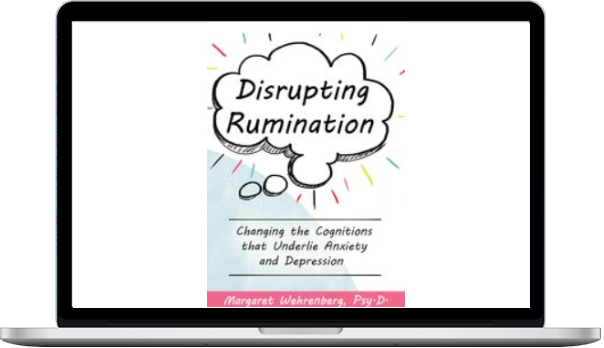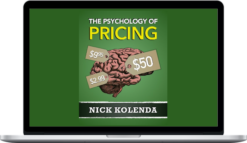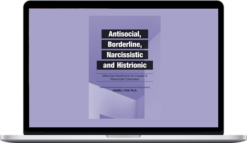Margaret Wehrenberg – Disrupting Rumination: Changing the Cognitions that Underlie Anxiety and Depression
$149.00 $63.00
»Delivery: Within 24hs
Description
Margaret Wehrenberg – Disrupting Rumination: Changing the Cognitions that Underlie Anxiety and Depression
Overactive brain circuitry can trap clients in cycles of rumination that can keep them anxious and depressed. Letting go of ruminating worries, or banishing persistent thoughts, like I’m not good enough or I’m worthless, isn’t easy for clients and when ruminations don’t shift, therapists can begin to feel stuck themselves.
Watch Margaret Wehrenberg and she will examine why clients lock into depressive thought patterns and why they feel they need to hold on to worry. You will learn practical interventions to use in-session for eliminating these patterns and replacing them with attitudes of calm and competency.
What You’ll Learn In Disrupting Rumination: Changing the Cognitions that Underlie Anxiety and Depression
Objectives
- Articulate methods to help clients identify perfectionism in thought and behavior and explore treatment interventions to decrease symptoms of anxiety.
- Implement strategies for stress management to reduce symptoms of anxiety in clients, including lifestyle changes, cognitive interventions and time management tools.
- Evaluate the negative impact of rumination on the brain structure and function to inform the clinician’s choice of treatment interventions.
- Ascertain the underlying neurological processes that impact depression symptoms in clients.
Outline
Rumination as The Link Between Anxiety and Depression
- Brief look at brain structure/function contributions
- The purpose of worry: cognitive mis-steps
- Explore the impact of guilt and interventions for guilt
Manage Worry
- Contain your worry in time
- Invite the worry
- Identify and alter “magical worry”
The Impact of Stress and 4 Competencies to Prevent Stress Damage on Health, Anxiety and Depression
- Eliminate the Stressor
- Manage time and environment
- Manage Attitude
- Practice Rest and Relaxation
Perfectionism and the Too Much Activity (TMA) person
- Perfectionism in thought and behavior and interrupt its negative effects
- When procrastination is perfectionism in disguise
A look at Depression – Raising Energy and Altering Cognitions
- Altering the neural networks that keep rumination in place
“Born to be blue” – Spotting and altering the impact of endogenous depression
- Change the network on purpose – “Start where you already are”
- “Charge the batteries” to raise energy
Situational Stressors
- Setting boundaries and utilizing help
- Mobilizing energy to respond
Interrupt helplessness
- Utilize mentors or lifelines
- Focus on strengths
Positive Impacts of Early Life Adversity
- Prepare to stay connected
- Changing Explanatory style
- Gratitude assignments
Target Audience
Psychologists, Addiction Counselors, Counselors, Social Workers, Marriage & Family Therapists, Nurses, and other Behavioral Health Professionals
About Margaret Wehrenberg
Margaret Wehrenberg, PsyD, a licensed clinical psychologist, is the author of nine books on the treatment of anxiety and depression, including her most recent e-book, Pandemic Anxiety: Fear, Stress, and Loss in Traumatic Times (January, 2021), bestselling book, The 10 Best-Ever Anxiety Management Techniques (W.W. Norton, 2018), and You Can Handle It: 10 Steps to Shift Stress from Problem to Possibility (PESI, 2017). She has also written a book for the general public, The 10 Best Anxiety Busters.
An expert on the treatment of anxiety and depression, she also has extensive training and expertise in the neurobiology of psychological disorders. In addition to clinical work, she coaches business professionals on managing anxiety and has contributed articles for the Psychotherapy Networker magazine. She has produced Relaxation for Tension and Worry, audio soundtracks for breathing, muscle relaxation and imagery to use with anxious clients.
Margaret blogs on depression for Psychology Today. Noted for humor, pragmatic treatment approaches, and her interactive teaching style, Dr. Wehrenberg is a sought-after speaker for conferences and trainings, consistently getting the highest ratings for her dynamic presentation and high-quality content. She is one of PESI’s most highly rated speakers and her evaluation from the most seasoned professionals often rank her training “as among the best I have ever attended.”
Speaker Disclosures:
Financial: Dr. Margaret Wehrenberg maintains a private practice. She receives royalties as a published author. She is an international presenter and receives compensation. Dr. Wehrenberg receives a speaking honorarium, book royalties, and recording royalties from PESI, Inc. She has no relevant financial relationships with ineligible organizations.
Non-financial: Dr. Margaret Wehrenberg is a member of the American Psychological Association and the Anxiety Disorder Association of America.
More courses from the same author: Margaret Wehrenberg
Delivery Policy
When will I receive my course?
You will receive a link to download your course immediately or within 1 to 21 days. It depends on the product you buy, so please read the short description of the product carefully before making a purchase.
How is my course delivered?
We share courses through Google Drive, so once your order is complete, you'll receive an invitation to view the course in your email.
To avoid any delay in delivery, please provide a Google mail and enter your email address correctly in the Checkout Page.
In case you submit a wrong email address, please contact us to resend the course to the correct email.
How do I check status of my order?
Please log in to HealingCourse account then go to Order Page. You will find all your orders includes number, date, status and total price.
If the status is Processing: Your course is being uploaded. Please be patient and wait for us to complete your order. If your order has multiple courses and one of them has not been updated with the download link, the status of the order is also Processing.
If the status is Completed: Your course is ready for immediate download. Click "VIEW" to view details and download the course.
Where can I find my course?
Once your order is complete, a link to download the course will automatically be sent to your email.
You can also get the download link by logging into your HealingCourse account then going to Downloads Page.
Related products
Total sold: 4










